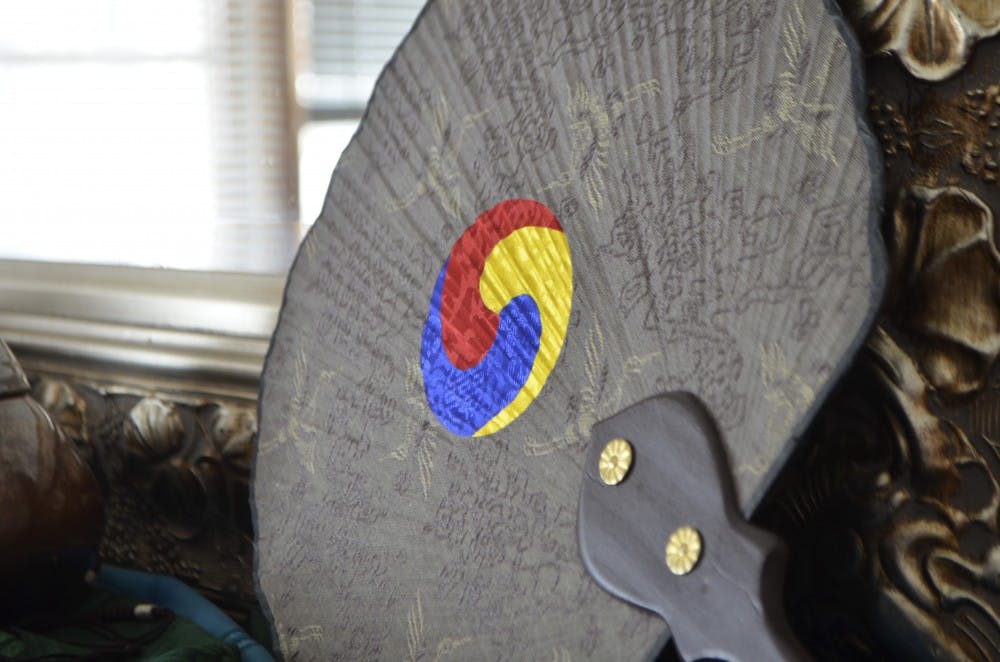By Elizabeth Syson | Echo
"We're open!" proclaims a plastic sign in Thai on the front door. Blankets, cushions and students litter the living room floor, especially on Saturday mornings, and laughter rings free. In the hallway hang flags: Brazil, Kenya, Australia-a piece of each corner of the world flutters as people pass.
This is the International Souphouse.
Its doors are open 24/7. Its occupants, called "soupies," invite visitors to stop in at any time for planned events, a good chat or just a break from campus.
" . . . a place for everyone."
"Have you eaten lately? Feel free to eat. When you finish, please replace the utensils."
Over 20 years ago, this sign resided in what students from five countries dubbed "the International Souphouse." They made their off-campus house a place of food and fellowship, leaving the door unlocked and keeping a supply of Ramen noodles available for hungry students.
Desiring to share their love of their home cultures, these original soupies hosted Friday night dinners consisting of international meals and cross-cultural discussions.
Today the Souphouse continues to unite students from around the world. As soupie Tony Seow said in 1993, "This is not just my place. It is a place for everyone."
" . . . here, people live together."
The Souphouse's traditions have changed over time, but its welcoming atmosphere has not. Instead of dinners, the soupies now host a Saturday morning worship session called Morning Dew. Featuring chocolate chip pancakes and fellowship, it attracts students from every dorm and class.
Movie nights, open couches for studying and a kitchen available for cooking sprees also make the Souphouse an inviting retreat for many missionary kids (MKs) and international students.
"I like to think of it as a home away from home," said junior Emily Brokaw, who attends Souphouse events regularly.
One current Souphouse tradition involves a clock that stopped at 10:00 one day. Students joke that they are never late for Morning Dew because it is always 10:00 at the Souphouse.
"I loved that we always left the clock at 10:00," said Rachel White, a soupie last year. "Because at the Souphouse, it's always time for pancakes and fellowship!"
The house itself has changed several times. With each move, soupies have brought the painted "International Souphouse" sign and a heartfelt desire to welcome anyone who visits.
Other Souphouse relics have included a toy iguana named Pol and a plastic ninja affectionately dubbed Shogo in honor of a previous soupie.
"I like this because here, people live together," said an original soupie. "We are able to bring differences out among our cultures."
Today the soupies carry on the tradition despite changes in the Souphouse's location and function.
" . . . it is a phoenix that is reborn . . . "
A year ago, a significant change was introduced: the Souphouse was adopted as a program under the Office of Intercultural Programs (OIP).
Though inhabited by a wide variety of people since its inception, the Souphouse has sheltered mostly MKs in recent years and has served almost exclusively with Mu Kappa, a student organization designed as a support group for MKs. OIP is now making a conscious effort to integrate the Souphouse with the International Student Society (ISS).
Despite this "new management," MKs are optimistic about the future of the Souphouse and display enthusiasm about seeing it widen its focus again.
"The spirit of the Souphouse is not that it is a place that maintains a bunch of old, stagnant traditions," said Tim Young, soupie from 1991 to 1994, "but rather, it is a phoenix that is reborn from the ashes of the past Souphouse and re-formed into a new creation every year."
" . . . curry-cooking missionary kids . . . "
No matter where it is located or which department "runs it," the Souphouse gets its identity from the people in it. Without them, it would be only a house with a lot of flags. Andy Rowell called soupies "the hospitable community of curry-cooking missionary kids," and this is an identity they embrace.
Soupies over the years have varied in background and personality.
"We have had shy soupies, loud soupies . . . good soupies and troublemaking soupies," said Young. "I think that so long as you have a few soupies . . . the Souphouse will become what it needs to be."
Soupies all have different ideas of vital characteristics, but they agree on a few. "Being a soupie means that you need to be willing to be flexible and hospitable as people may drop over, frequently unannounced," said White. Although she admitted being a soupie could be hard at times, she believes the friendships made it worth the work.
On a campus dominated by a theme of intentional community, the International Souphouse provides a place for cultures to mix intentionally, yes, but also naturally. It is a place by people, for people, where love, acceptance and hospitality are key and there is always room for one more.
(Thumbnail photograph by Brittany Smith.)



